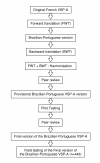Cross-cultural adaptation and psychometric properties of the Brazilian-Portuguese version of the VSP-A (Vécu et Santé Perçue de l'Adolescent), a health-related quality of life (HRQoL) instrument for adolescents, in a healthy Brazilian population
- PMID: 21272317
- PMCID: PMC3042386
- DOI: 10.1186/1471-2431-11-8
Cross-cultural adaptation and psychometric properties of the Brazilian-Portuguese version of the VSP-A (Vécu et Santé Perçue de l'Adolescent), a health-related quality of life (HRQoL) instrument for adolescents, in a healthy Brazilian population
Abstract
Background: Health-related quality of life (HRQoL) assessment, encompassing the adolescents' perceptions of their mental, physical, and social health and well-being is increasingly considered an important outcome to be used to identify population health needs and to provide targeted medical care. Although validated instruments are essential for accurately assessing HRQoL outcomes, there are few cross-culturally adapted tools for use in Brazil, and none designed exclusively for use among adolescents. The Vécu et Santé Perçue de l'Adolescent (VSP-A) is a generic, multidimensional self-reported instrument originally developed and validated in France that evaluates HRQoL of ill and healthy adolescents.
Purpose: To cross-culturally adapt and validate the Brazilian-Portuguese version of the VSP-A, a generic HRQoL measure for adolescents originally developed in France.
Methods: The VSP-A was translated following a well-validated forward-backward process leading to the Brazilian version. The psychometric evaluation was conducted in a sample of 446 adolescents (14-18 years) attending 2 public high schools of São Gonçalo City. The adolescents self-reported the Brazilian VSP-A, the validated Psychosomatic Symptom Checklist and socio-demographic information. A retest evaluation was carried out on a sub-sample (n = 195) at a two-week interval. The internal construct validity was assessed through confirmatory factor analysis (CFA), multi-trait scaling analyses, Rasch analysis evaluating unidimensionality of each scale and Cronbach's alpha coefficients. The reproducibility was evaluated by intra-class correlation coefficients (ICC). Zumbo's ordinal logistic regression analysis was used to detect differential item functioning (DIF) between the Brazilian and the French items. External construct validity was investigated testing expected differences between groups using one-way analysis of variance (ANOVA), Mann-Whitney tests and the univariate general regression linear model.
Results: CFA showed an acceptable fit (RMSEA=0.05; CFI=0.93); 94% of scaling success was found for item-internal consistency and 98% for item discriminant validity. The items showed good fit to the Rasch model except 3 items with an INFIT at the upper threshold. Cronbach's Alpha ranged from 0.60 to 0.85. Test-retest reliability was moderate to good (ICC=0.55-0.82). DIF was evidenced in 4 out of 36 items. Expected patterns of differences were confirmed with significantly lower physical, psychological well being and vitality reported by symptomatic adolescents.
Conclusions: Although DIF in few items and responsiveness must be further explored, the Brazilian version of VSP-A demonstrated an acceptable validity and reliability in adolescents attending school and might serve as a starting point for more specific clinical investigations.
Figures
Similar articles
-
[Semantic and item equivalences of the Brazilian Portuguese version of the Vécu et Santé Perçue de l'Adolescent: an adolescent quality-of-life questionnaire].Cad Saude Publica. 2012 Oct;28(10):1993-2001. doi: 10.1590/s0102-311x2012001000017. Cad Saude Publica. 2012. PMID: 23090178 Portuguese.
-
[Reliability and validity of the Spanish version of the health and quality-of-life questionnaire, the Vecú et Santé Perçue de l'Adolescent (VSP-A)].Aten Primaria. 2006 Mar 15;37(4):203-8. doi: 10.1157/13085950. Aten Primaria. 2006. PMID: 16545264 Free PMC article. Spanish.
-
[Cross-cultural adaptation to Spanish of the Vécu et Santé Perçue de l'Adolescent (VSP-A):: a generic measure of the quality of life of adolescents].Rev Esp Salud Publica. 2002 Nov-Dec;76(6):701-12. Rev Esp Salud Publica. 2002. PMID: 12602138 Spanish.
-
[Psychometric characteristics of questionnaires designed to assess the knowledge, perceptions and practices of health care professionals with regards to alcoholic patients].Encephale. 2004 Sep-Oct;30(5):437-46. doi: 10.1016/s0013-7006(04)95458-9. Encephale. 2004. PMID: 15627048 Review. French.
-
Reliability and validity of cross‑culturally adapted oral health‑related quality‑of‑Life instruments for Brazilian children and adolescents: a systematic review.BMC Oral Health. 2024 Feb 10;24(1):214. doi: 10.1186/s12903-024-03940-4. BMC Oral Health. 2024. PMID: 38341559 Free PMC article.
Cited by
-
Application of Rasch Analysis for Development and Psychometric Properties of Adolescents' Quality of Life Instruments: A Systematic Review.Adolesc Health Med Ther. 2020 Nov 11;11:173-197. doi: 10.2147/AHMT.S265413. eCollection 2020. Adolesc Health Med Ther. 2020. PMID: 33204203 Free PMC article. Review.
-
Factor structure and short version of the modified Fresno test to assess the use of the evidence-based practice in physiotherapists.BMC Med Educ. 2021 Feb 27;21(1):135. doi: 10.1186/s12909-021-02535-9. BMC Med Educ. 2021. PMID: 33639895 Free PMC article.
References
-
- Blum RW, Nelson-Mmari K. The Health of Young People in a Global Context. J Adolesc Health. 2004;35:402–418. - PubMed
-
- Censo Demográfico BRASIL 2000 - Resultados do universo. http://www.ibge.gov.br/home/estatistica/populacao/censo2000/tabelabrasil... Accessed May 11, 2008.
-
- The Reproductive Health of Adolescents: A strategy for action, A Joint WHO/UNFPA/UNICEF Statement. World Health Organization, Geneva; 1989.
-
- Minayo MCS, Souza ER. Violência Para Todos. Cad Saúde Pública. 1993;9(1):65–78. - PubMed
Publication types
MeSH terms
LinkOut - more resources
Full Text Sources
Medical
Miscellaneous


